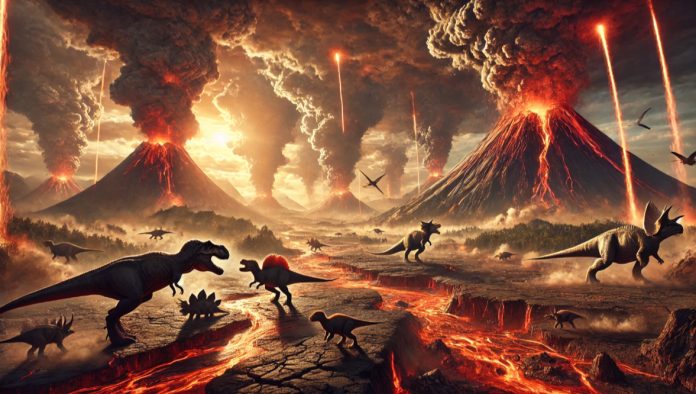
For years, scientists have debated whether massive volcanic eruptions or a meteorite impact caused the extinction of dinosaurs 66 million years ago.
New research from Utrecht University and the University of Manchester shows that the meteorite impact, not volcanic activity, was the main reason for the dinosaurs’ extinction.
This study, published in Science Advances, provides fresh insights into what happened during this dramatic time in Earth’s history.
The Debate: Volcanoes vs. Meteorite
The Chicxulub meteorite, which struck the Gulf of Mexico, is widely accepted as the primary cause of the dinosaur extinction.
However, some scientists have argued that massive volcanic eruptions on the Indian continent, known as the Deccan Traps, might have also played a role.
These eruptions occurred both before and after the meteorite impact, releasing large amounts of carbon dioxide (CO2), sulfur, and dust into the atmosphere.
These gases and particles could have caused global cooling and warming, potentially harming life on Earth.
To understand how these volcanic eruptions affected Earth’s climate, scientists analyzed ancient peat deposits from the United States.
These peats contain fossilized molecules produced by bacteria that change depending on the temperature of their environment. By studying these molecules, researchers reconstructed a detailed timeline of air temperatures during the period leading up to the meteorite impact.
The findings show that a major volcanic eruption occurred about 30,000 years before the meteorite hit. This eruption caused a drop in global temperatures by at least 5°C, likely due to sulfur particles blocking sunlight. However, by 20,000 years before the meteorite impact, temperatures had already recovered, likely aided by volcanic CO2, which traps heat.
This means that the effects of the volcanic eruptions had worn off thousands of years before the meteorite struck.
Unlike the gradual effects of volcanic eruptions, the meteorite impact caused immediate and catastrophic changes.
It triggered massive wildfires, earthquakes, tsunamis, and a phenomenon known as “impact winter,” where sunlight was blocked by dust and debris in the atmosphere. These events led to a collapse of ecosystems and ultimately wiped out the dinosaurs.
“While the volcanic eruptions did change the climate, they happened too early to play a major role in the extinction of the dinosaurs,” explains Lauren O’Connor from Utrecht University. “The meteorite impact was the fatal blow.”
This research gives scientists a better understanding of the timing and effects of these two major events. The team is now applying the same method to study other critical moments in Earth’s history to learn how past climates shaped life on our planet.
This study not only settles a long-standing debate but also highlights how detailed climate records can help us piece together Earth’s ancient history.
The meteorite impact, with its devastating chain of events, remains the ultimate reason for the end of the dinosaur age.



